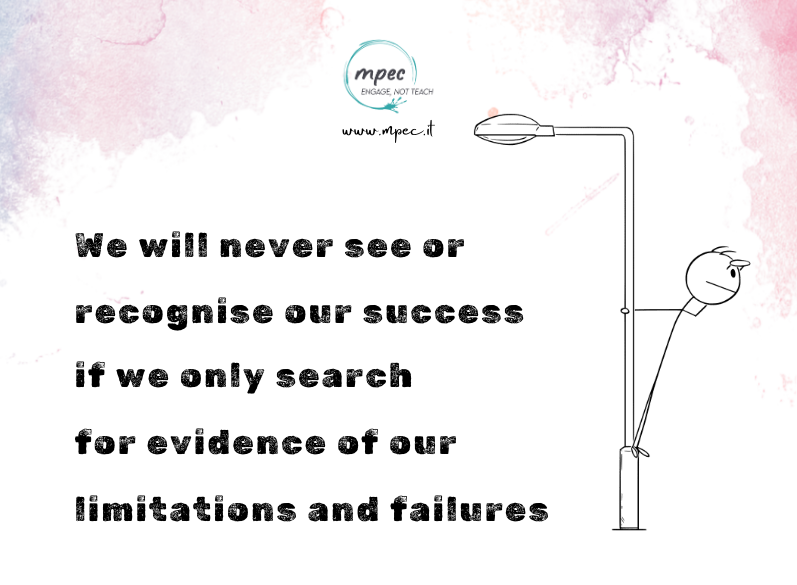Often, we think, “My English isn’t improving!” and we are convinced it’s true. We don’t ask ourselves if we have the right tools to measure our linguistic growth. Language is not a simple subject but a meta-communicative tool that takes time to acquire. To maintain motivation, it’s essential to know how to nurture it correctly. This article addresses precisely that. It was written for you if you fear that the effort you’re putting into improving is in vain.
How To Measure Growth Beyond Language Certificates or Tests
If your goal in learning English is to feel less stuck in conversations, experience less discomfort during presentations, or understand more when talking to people, you might find it hard to measure your progress. Often, we feel we’re not improving if, after a few months of training, the block, discomfort, or lack of understanding are still there. However, this perception can be misleading. You might actually be improving but don’t know how to measure the Key Performance Indicators (KPIs) of your growth because your goal is binary (0-1: is there a block or not? Is there discomfort or not?). Emotions make it hard to evaluate size or intensity.
Why seeing my own growth in English is SO difficult?

Measuring improvement in English can be particularly challenging for several reasons:
Gradual Progress: Learning a language is a slow and gradual process. Improvements happen in small steps that can be hard to notice day by day.
Often, we expect immediate results, but the reality is that mastering a language takes time and consistent practice
Emotional Goals: As mentioned, many of our goals are tied to feelings and emotions, like feeling less anxious during conversations or more confident in presentations. These goals are not easily quantifiable and often don’t show linear improvements.
Unrealistic Expectations: Many people have unrealistic expectations about how quickly they should improve. If progress doesn’t match these expectations, they can feel discouraged, even if they are actually improving.
Limited Feedback: Unlike other skills, language learning doesn’t always provide immediate feedback. Without regular and constructive feedback, it can be hard to know if you’re progressing in the right direction.
Complexity of the Language: English, like any other language, is complex and involves multiple skills (writing, reading, listening, and speaking). Progress in one area doesn’t necessarily mean you’ll feel more confident in all others.
Beyond Tests and Certificates
Standardised tests and English language certificates, such as TOEFL, IELTS, or Cambridge, are useful for objectively assessing language skills. However, they cannot capture all aspects of personal progress, especially those related to confidence and comfort in using the language. This is why adopting a more holistic and qualitative approach to measuring growth is important.
Self-Assessment and Awareness
One of the most effective methods to monitor your progress is self-assessment. Think about specific situations where you have recently used English. For example, consider an email you wrote, a conversation you had, a presentation you gave, or a meeting where you had to listen to and understand English. Regularly analysing yourself in these situations will reveal that, even if it wasn’t apparent before, your English is improving.
A Form for Self-Awareness and Growth Measurement
To help you monitor your progress, we have created a self-assessment form that allows you to reflect on your recent and specific experiences with English. Complete the form now and repeat it after 1 or 2 months to see your progress.
The Form in Italian
The Form in English
- Discover How to Evaluate Your English Progress Beyond Exams
- Why is it Difficult to See Your Own Improvement in English?
- Strategies to Measure Your English Growth in Real Situations
- Self-Assessment and Awareness: Monitoring Progress in English
- Overcome Negative Perceptions: Correctly Evaluate Your English Skills
- Emotional KPIs: Measuring Comfort and Confidence in English
- Self-Assessment Form: Analyse Your Growth in English
#EnglishGrowth #MeasuringProgress #SelfAssessmentEnglish #LanguageImprovement #LanguageAwareness #EmotionalKPIs #EnglishConfidence #EnglishLearning #LanguageTraining #EnglishCompetence #LearnEnglish #EnglishEvaluation #EnglishLanguage #PersonalGrowth





